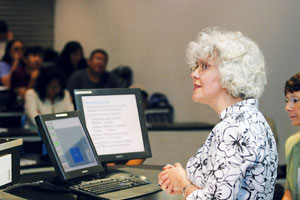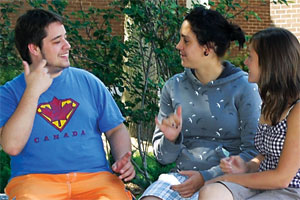|
|
Classroom readyGroundbreaking study probes teacher education in CanadaTeachers of future classroom teachers don’t agree with their students on various key issues, including program content and teacher preparedness. These are just some of the findings from a groundbreaking report, Teacher Education in Canada: A Baseline Study, the first comprehensive look at teacher education across Canada. “Areas of content, knowledge and skill that are highly valued in the field are not being emphasized as strongly in teacher education programs as they might be,” according to the report’s authors, Robert Crocker and David Dibbon. Crocker, professor emeritus at Memorial University’s Faculty of Education, is president of Atlantic Evaluation and Research Consultants. He has taught at OISE, Stanford and Michigan State. Dibbon is Associate Dean at Memorial’s Faculty of Education. Their 139-page study, released in June, is based on a review of education programs in 56 universities and a national survey of recent graduates who have been teaching for up to two years (1,853), principals (865) and faculty (343). The margin of error is plus/minus five per cent, 19 times out of 20. The research was commissioned by the BC-based charitable Society for the Advancement of Excellence in Education, which describes itself as a non-partisan organization that supports public education. The recent graduates indicated that useful fields of study, particularly classroom management and how to motivate students to learn, received little emphasis in their training. Few principals (15 per cent) rated new teachers as “very well prepared” for classroom challenges. The new teachers agreed – only 14 per cent said they were “very well prepared.” As for educational program content, teachers and principals tended to give relatively higher ratings to practical instruction compared to faculty, who favoured foundational theory. However, all three groups supported an increased focus on the technical aspects of teaching. The national survey found great differences in teacher education programs across the country. Two-semester consecutive programs (education as a supplementary degree) are the norm in Ontario, while concurrent programs (education as a first degree) are more popular elsewhere. Principals and faculty preferred concurrent to consecutive programs for elementary teachers and split when it came to what was best for secondary teachers. The research also found that practicums are generally shorter in Ontario than elsewhere. Recent graduates gave higher marks to their practicum-supervising teachers than to their professors. The graduates and most of the principals wanted more practical classroom experience, but three-quarters of faculty members thought the practicums were the appropriate length. The survey also found a disconnect when it came to views on collaboration between faculties of education and the school system. About two-thirds of the principals thought the current level was “weak” or “very weak.” The same proportion of faculty said it was “strong” or “very strong.” Dibbon and Crocker conclude: “There is a need for mutual efforts on the part of the school system and faculties of education to increase communication and collaboration on program design and delivery and [to determine] how best to support new teachers entering the profession.” The authors say their findings just scratch the surface. “Although Canada produces approximately 18,000 new teachers every year, there has been surprisingly little systematic study of their preparation,” they write. “While the diversity of programs may be a strength, there is an absence of comparative evidence on their efficacy.” To view the full report visit www.saee.ca. visitorsDelegations visit the College to share and gather information on a range of education issues, including accreditation, qualifications and standards of practice.
EnvironmentPaper progress, compostable bags for PSProfessionally Speaking has taken two significant steps forward in its ecological printing and packaging with this issue. First, this edition is printed on 100 per cent recycled paper. In addition, for copies bundled with catalogues or other print material for mail delivery, bundling will now be done in fully compostable bags. The new transparent bagging material represents a significant environmental improvement over both traditional petroleum-based polybags and the vegetable-based resins previously used, which were 80 per cent biodegradable. “The College is committed to reducing its environmental impact in all of our activities,” says PS publisher Richard Lewko, the College’s Director of Corporate and Council Services. “We are not resting on past accomplishments. With the help of our suppliers, we look for ongoing improvement.” us education studyEconomic well-being, academic performance linked
Called What Works in Schools: What We Know and What We Need to Learn to Address Inequalities in Education, the study covers a broad range of areas from early childhood education to children’s health. “Our belief is that because inequities in schools stem from broader inequities in society, we can’t fix them without understanding and addressing all the causes,” says professor Michael Rebell, executive director of the college’s Campaign for Educational Equity. The Equity Matters study discovered that class size, while important, does not by itself boost student outcomes. Teacher effectiveness is even more important. For more information go to www.tc.edu/annual. AtlanticScotland’s teachers have new code of conductThe General Teaching Council for Scotland (GTCS), which regulates the teaching profession in Scotland, has revised its professional code of conduct. The Code of Professionalism and Conduct sets out the key principles and values for certified teachers and explains to the public the standard of conduct the profession expects of its members. The code emphasizes a teacher’s responsibility to set professional boundaries with students, to treat students fairly and with respect, to maintain professional skills and knowledge through ongoing learning, and to deal with colleagues and parents in a professional manner. The Code of Professionalism and Conduct also sets out the powers of the GTCS to investigate complaints against members and to impose sanctions if a member is found guilty of misconduct or serious professional incompetence. The new code was issued in May 2008 after widespread consultation with the profession, parents, unions and employers. GTCS Registrar Matthew MacIver said that, in issuing the code, the General Teaching Council was upholding the standing of the profession in the eyes of the public, government, education stakeholders and teachers themselves. In carrying out its mandate, the organization was being accountable to both the public and the profession. The Code of Professionalism and Conduct is available on the General Teaching Council for Scotland web site at www.gtcs.org.uk. PacificNew Zealand moves to broaden criteria for misconduct rulesNew Zealand has broadened the criteria for complaints of professional misconduct against teachers. An amendment to the New Zealand Teachers Council rules in August will hold teachers there accountable for “any act or omission that brings or is likely to bring discredit to the profession.” The Teachers Council, New Zealand’s self-regulatory body for teaching, wanted to bring its understanding of misconduct in line with that of other professions, such as nursing, and address gaps in the previous criteria. “What has become apparent to the Council is that no matter how specific the definition of serious misconduct is, there are always those cases where conduct not anticipated or previously thought of can arise and bring discredit to the profession,” said Raewyn Ogilvie, a legal administrator with the Teachers Council. The country’s 90,000 teachers can now be referred to a Teachers Council disciplinary tribunal for allegations of physical, sexual or psychological abuse of children; inappropriate relationships with students; viewing pornography at school; using, making or supplying drugs; neglect or ill-treatment of a child or animal in their care; or crimes punishable by three months in jail. For more information see www.teacherscouncil.govt.nz/cnc. flag RaisingFrancophone identity riding high in Ottawa
“The flags – emblems of Ontario’s francophonie – are important heritage symbols for future generations,” says Alain Vachon, former chair of the Association canadienne-française de l’Ontario – Ottawa. The Ottawa region’s francophone community, under the guidance of an organizing committee established in August 2005 and chaired by Vachon, launched the Monuments de la francophonie d’Ottawa project. The project has so far established six historic sites, each flying the Franco-Ontarian flag. The commemorative sites honour the contributions of francophones in various fields, including education, health and the economy, and in various francophone ethno-cultural communities. The project is designed to contribute to francophone identity among students in the region. On June 29, 2001, the Government of Ontario granted the Franco-Ontarian flag the status of official symbol of the province. The flag is half green and half white, representing summer and winter, with a white fleur-de-lys, symbol of the worldwide Francophonie, centred on the green background, and a green trillium, the floral emblem of Ontario, centred on the white background. A surprising correlationThe quicker kids write, the better they learnTraditionalists take heart. It turns out that there is value, after all, in good penmanship. Recent studies show that teaching elementary school children how to write cursive improves their ability to learn and express themselves. As well, the faster younger kids write, the better they do later. “Handwriting speed in second grade predicts essay quality and quantity in sixth grade,” says US academic Stephen Peverly, who is publishing a study on the correlation next year. “We first thought it just measured motor speed, but it bumps out all the other verbal measures that I have studied – verbal ability, verbal working memory and spelling.” The research suggests that when children are being taught handwriting, they are also being taught how to learn and express themselves. Handwriting fluency appears to be a fundamental building block of learning. Peverly sets out to answer another puzzling question: Why do Asian kids perform better in math than their US counterparts? The answer, he says, is not because of cultural differences. It is simply because their teachers are better at math. Peverly studied third-grade teachers in China and the US and found that 95 per cent of the Chinese instructors understood fractions well compared to 30 per cent of the Americans. While the US teachers were more knowledgeable about education theories on how to teach math, the Chinese had a stronger mastery of the subject matter. “If I were hiring a teacher,” Peverly says, “I wouldn’t just look at the number of math courses on the transcript. I would test them to see what they know.” anti-bullying
Browser ResourceNew software reduces frustration for autistic kidsAutistic children who find some computer applications confusing and confounding may now be able to master them as a result of a new software breakthrough. Called the ZAC Browser, the software is the creation of a grandfather concerned for his autistic six-year-old Montréal-area grandson, Zackary. Designed for autistic children who face extreme frustration from overstimulation, the ZAC Browser simplifies the computer experience by greatly restricting the user’s options. It is a full-screen application that eliminates potentially annoying distractions. For example, it removes the right-click function of the mouse and disables extraneous commands such as “print screen.” It blocks most web sites so caregivers don’t have to worry about violent or adult-themed material. The home page is a cheerful aquarium with icons for games, music and stories lining the bottom of the screen. Zackary’s mother says that he starts the browser by himself and enjoys its features. Unlike his television, his computer is no longer the object of aggressive acts. “This is adorable; this is fantastic,” said Marg Whalen, on viewing the ZAC Browser for the first time. Whalen is executive director of the Toronto-based Geneva Centre for Autism, which develops and delivers clinical intervention services and training. “Children with autism-spectrum disorders (ASD) are typically distracted by the superfluous,” she explained. “This will help them focus on key elements and increase their likelihood of success.” Long-time ASD resource teacher Leslie Broun agrees. “Many ASD children enjoy computers,” says Broun, who has 22 years of field experience and now works for the Peel DSB. “This will help them learn, using well categorized subjects on a whole spectrum of interests. The autistic learn through visual cues and this site is very visually appealing.” And it’s free because its developer, John LeSieur, president and CEO of the Las Vegas-based software firm People CD, wants to help others besides his grandson who are affected by ASD. To download the ZAC Browser, go to www.zacbrowser.com. Video contestBilingual students win $21,000
Each winner received a $20,000 bursary from the University of Ottawa as well as a $1,000 cash prize from ACPI. Ontario winners were Andrej Sakic (first prize) and Amy Maan (third prize), both from Brantford Collegiate Institute and Vocational School. Participating students had to make a 30-to-60-second video in French on a French-language-related theme. “The contest allows students to enhance their mastery of French while exploring their creativity,” says Marie Larivière, Director of ACPI, who finds this a great way to engage students in ACPI’s immersion program. She notes that teachers can incorporate the contest into oral learning activities. The 2008 contest was open to French-immersion students enrolled full-time in Grades 11 or 12. Immersion clip 2009, which has received additional financial support from the federal department of Canadian Heritage, will be open to students from Grades 9 through 12. The deadline for participation in 2009 is February 15. For more information or to see this year’s winning clips, visit www.acpi.ca. Information on the 2009 contest will be posted in the fall of 2008. Faculty Tour
International competitionPS takes silver Tabbie award
PS, which won three 2006 awards, took silver this year for feature design for the cover story Cyberbullying: Threat or Teachable Moment? in the September 2007 edition. The same article won honourable mentions in the feature article category for the design of its opening spread, for its cover digital imagery and for the story itself, written by Beatrice Schriever. Money masteryNew free software helps teachers train students in financial basicsHigh school teachers who want to prepare their students for the day-to-day financial pressures of the real world, take note. A new, free, financial literacy interactive computer program will be available to help this fall. The 11-module program, accompanied by lesson plans, overheads and handouts, is designed to help young people understand such basic concepts as budgeting, saving, credit and debt. It is being offered in English and French by the Financial Consumer Agency of Canada to help meet learning objectives in courses such as career planning, business education and mathematics. The program illustrates different financial circumstances through the use of animated characters. Starting in September, you can download this free resource at www.themoneybelt.ca. French-language schoolsOpportunity for learning LSQ
The objective was to provide the French-language school boards with a pool of francophone teachers who would be qualified to teach students who are Deaf or hard of hearing. The shortage of teachers who can communicate in LSQ is a further challenge for Deaf children who do not always have an opportunity to communicate in LSQ or to improve their literacy skills. Successful candidates will be invited to attend an intersession during the 2008/09 school year and a summer camp scheduled for 2009. Those who successfully complete all three sessions will have the prerequisites for enrolment in the Additional Qualification course: Teaching Students Who Are Deaf or Hard of Hearing, delivered jointly by the University of Ottawa and Centre Jules-Léger. For more information contact roger.gauthier@uottawa.ca. Notable DatesSEPTEMBER8 – International
Literacy Day 14–21 – AIDS Walk for Life Week 21 – International Day of Peace 26 – Terry Fox National School Run Day OCTOBERChild Abuse and Neglect Prevention Month 5 – International World Teachers’ Day NOVEMBER16 – International Day for Tolerance 25 – International Day for the Elimination of Violence against Women DECEMBER1 – World AIDS Day 2 – UN International Day for the Abolition of Slavery 5 – International Volunteer Day 6 – National Day of Remembrance and Action on Violence against Women 14 – International Children’s Day of Broadcasting For other international observances visit www.un.org, or try www.unac.org |













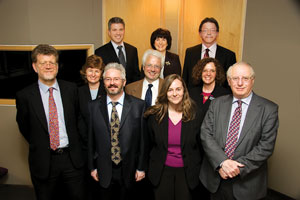
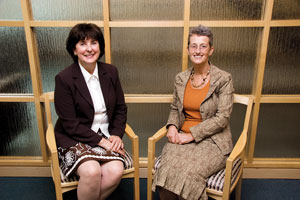
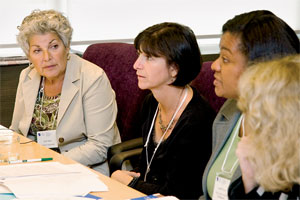
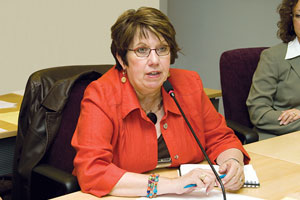
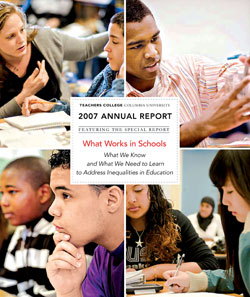 A major US education study
A major US education study Strolling around
Strolling around 

